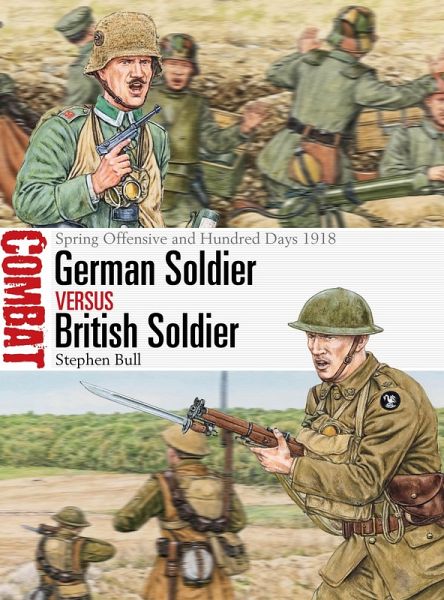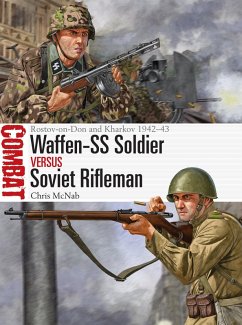
German Soldier vs British Soldier (eBook, PDF)
Spring Offensive and Hundred Days 1918
Illustrator: Hook, Adam
Versandkostenfrei!
Sofort per Download lieferbar
12,95 €
inkl. MwSt.
Weitere Ausgaben:

PAYBACK Punkte
6 °P sammeln!
This illustrated study pits the Kaiser's troops against their British opponents during the climactic year of 1918 on the Western Front. Launched on 21 March 1918, the Spring Offensive saw Germany use veteran, highly trained assault troops and innovative assault tactics to encircle and outflank the British and Empire forces manning the front line, hoping to force the French to seek terms and hand victory to Germany. After this attempt stalled, the Allied armies mounted a series of offensives during the so-called 'Hundred Days', actions that pushed the Kaiser's forces back and prompted the demor...
This illustrated study pits the Kaiser's troops against their British opponents during the climactic year of 1918 on the Western Front. Launched on 21 March 1918, the Spring Offensive saw Germany use veteran, highly trained assault troops and innovative assault tactics to encircle and outflank the British and Empire forces manning the front line, hoping to force the French to seek terms and hand victory to Germany. After this attempt stalled, the Allied armies mounted a series of offensives during the so-called 'Hundred Days', actions that pushed the Kaiser's forces back and prompted the demoralized German High Command to sue for peace. In this book, Stephen Bull shows how the British Army on the Western Front fared as it survived the Spring Offensive and then went on the attack during the Hundred Days. While the picked units spearheading the German offensive were well-trained and -armed but short of supplies, the regular divisions following in their wake would prove much less resolute. The fighting would see both sides' forces tested to the limit and beyond, as initial German progress gave way to stalemate and the Allies then took the offensive, driving the Germans back. Featuring specially commissioned artwork and mapping, carefully chosen archive photos and expert analysis and commentary, this study assesses the fighting men on both sides during the climactic months of fighting on the Western Front in 1918.













